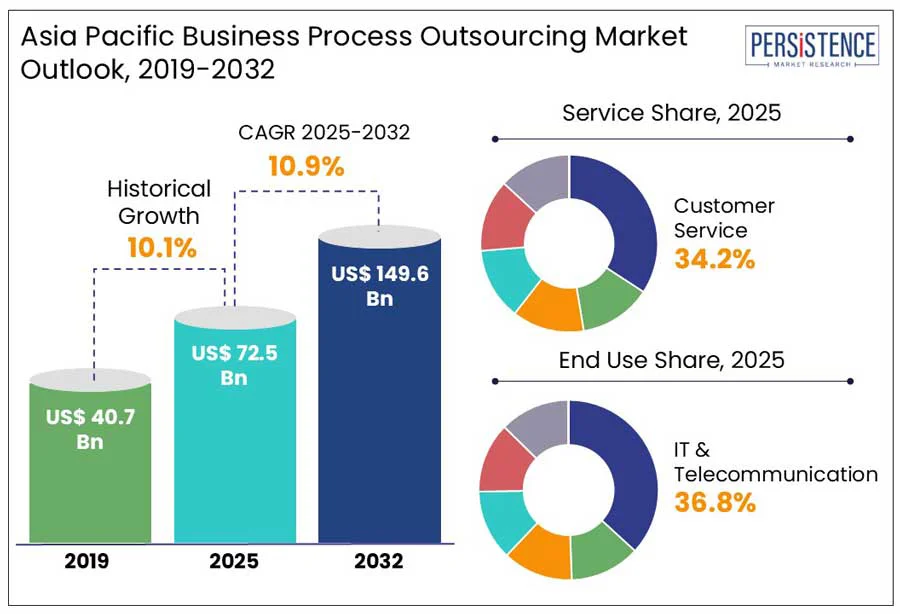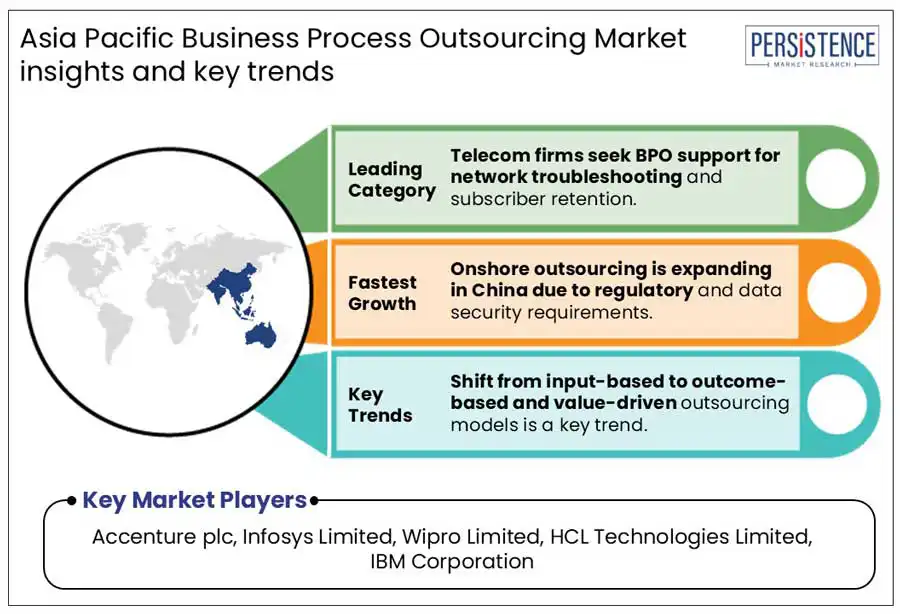ID: PMRREP35380| 170 Pages | 2 Jun 2025 | Format: PDF, Excel, PPT* | IT and Telecommunication

The Asia Pacific business process outsourcing market size is predicted to reach US$ 149.6 Bn in 2032 from US$ 72.5 Bn in 2025. It will likely witness a CAGR of around 10.9% in the forecast period between 2025 and 2032. Asia Pacific is no longer just a back-office destination, it is the new engine room of strategic transformation in the global Business Process Outsourcing (BPO) landscape. From outcome-linked financial analytics centers in India to AI-backed customer experience hubs in the Philippines, the region has rapidly evolved into a diverse ecosystem. It will likely be propelled by a rising focus on value-based delivery models and rapid digital adoption through 2032. It is also expected to attract multinationals looking for long-term competitive advantages and not just cost savings.

Key Industry Highlights
|
Market Attribute |
Key Insights |
|
Asia Pacific Business Process Outsourcing Market Size (2025E) |
US$ 72.5 Bn |
|
Market Value Forecast (2032F) |
US$ 149.6 Bn |
|
Projected Growth (CAGR 2025 to 2032) |
10.9% |
|
Historical Market Growth (CAGR 2019 to 2024) |
10.1% |
Access to specialized expertise is considered a key factor bolstering the Asia Pacific business process outsourcing market growth through 2032, finds Persistence Market Research. Businesses across the globe are constantly demanding niche capabilities, including digital customer experience, cybersecurity, AI-based analytics, and regulatory compliance. They are selecting BPO partners in Asia Pacific not just for labor cost benefits but also for their domain-specific talent pools. For example, HSBC, in 2024, outsourced a significant portion of its financial crime compliance analytics to a specialized BPO provider in the Philippines due to its experience in transaction monitoring.
Cost savings also remain an important driver, mainly in terms of margin pressures and economic uncertainty. The cost-benefit dynamic, however, has evolved as clients are no longer looking for cheap labor but aiming to enhance total cost of ownership by offloading entire digital functions. Key BPO hubs in Asia Pacific are providing business process automation solutions and outcome-based pricing models, making these attractive to multinationals demanding modernized operations. Infosys BPM's 2023 deal with a Japan-based electronics company, for instance, includes a built-in automation roadmap for HR and finance tasks.
Intellectual Property (IP) protection concerns are expected to become a hurdle for BPO expansion across Asia Pacific in the foreseeable future. While countries such as Singapore and India have relatively mature IP frameworks, several emerging markets continue to suffer from opaque legal recourse and inconsistent enforcement. This issue is more pronounced in processes, including design prototyping, data modeling, and research support, where IP risk directly affects a company’s competitive edge. Hence, organizations from the U.S. and Europe often insist on strong IP clauses and data localization, but enforcement across Asia Pacific remains patchy.
Language and cultural barriers are also anticipated to create hindrances for the market, specifically in customer-facing roles. While the Philippines has developed a strong reputation for Western cultural associations and accent-neutral English, a few markets still struggle with localization. Such issues are predicted to erode customer trust and compel organizations to reconsider offshoring decisions even if cost savings are significant. To solve these, some BPOs in Malaysia and India have started investing in region-specific cultural training programs.
?Increasing shift toward outcome-based business models is speculated to create new growth avenues for BPO providers in Asia Pacific. This is because clients are increasingly seeking measurable impact such as enhanced compliance rates, low turnaround times, and high customer satisfaction. This model has enabled BPO firms to reposition themselves as strategic partners instead of just cost centers. WNS, for example, signed an outcome-based deal with an Australia-based airline, where payments are tied to customer experience metrics, including complaint resolution time and Net Promoter Score (NPS).
The trend is gaining traction in e-commerce, BFSI, and healthcare sectors, where real-time data analytics, customer engagement quality, and automation are becoming the core performance indicators. For mid-tier BPO providers, outcome-based models are unlocking entry into high-value contracts where they compete based on tech integration and domain specialization instead of scale. Malaysia-based Daythree Business Services and India-based Firstsource, for instance, have started providing bundled solutions that combine domain-specific consulting, analytics, and RPA with performance-linked pricing. The model is further fostering developments through shared risk frameworks.
In terms of service, the Asia Pacific business process outsourcing market is divided into finance and accounting, KPO, human resources, procurement, and customer service. Out of these, the customer service segment will likely account for a market share of approximately 34.2% in 2025. This is attributed to the rapid digital expansion of consumer-facing industries such as online travel, fintech, and e-commerce. Companies are outsourcing multilingual customer support to regional BPO hubs as these sectors scale across various countries with distinct consumer behaviors and languages.
Finance and accounting, on the other hand, are expected to witness a significant CAGR from 2025 to 2032. This is owing to the urgent requirement for real-time yet affordable financial insights in a volatile economic environment. Multinational companies are now centralizing their finance and accounting operations in regional hubs, including Malaysia and India to optimize financial reporting, payroll processing with cloud-based payroll software, receivable, and accounts payable. Shell, for example, recently extended its finance operations in Bangalore to meet its global back-office finance requirements, including treasury functions and tax compliance.
Based on end-use, the market is segregated into BFSI, manufacturing, healthcare, IT and telecommunication, and retail. Among these, IT and telecommunication is predicted to hold around 36.8% of the Asia Pacific business process outsourcing market share in 2025. Telecom operators across the region often deal with complex service delivery models that require rapid fault resolution and continuous support. To smoothly manage this, they are poised to outsource not just customer service but also technical helpdesk and network monitoring functions.
BFSI has emerged as an important segment in the market due to the ongoing digital overhaul of financial services, which has spurred demand for specialized outsourcing in certain areas. As financial institutions shift toward self-service and mobile banking software solutions, the requirement for smooth digital experiences and 24/7 multilingual support has accelerated several companies to outsource operations. Of late, Standard Chartered, for instance, extended its partnership with Infosys BPM to manage digital customer journeys and risk operations across its Asia Pacific retail banking operations.

In 2025, China is estimated to remain at the forefront of growth with a share of about 25%. This is attributed to rising focus of local BPOs on serving domestic industries, including e-commerce, insurance, and banking, where regulatory and language familiarity are important. Chinasoft International and Neusoft, for example, have been scaling their operations to support AI-backed customer service solutions and smart city projects for provincial governments and local banks. A significant shift is the surge of intelligent BPO (iBPO), where cloud platforms, natural language processing, and automation are being integrated into operations.
Alibaba Cloud and Tencent Cloud have implemented enterprise-grade BPO solutions made for sectors such as retail and healthcare. Alibaba’s DAMO Academy, for example, recently launched AI-powered service desks for its e-commerce ecosystem, automating back-office tasks, including inventory coordination and refunds. China is further benefiting from its push for dual circulation, which has resulted in a focus on customer lifecycle management, data security, and compliance. This is evident in the wake of strict data governance norms under the Personal Information Protection Law (PIPL).
India is currently undergoing a structural transition, shifting away from conventional voice-based support to knowledge-intensive, high-value services. Key players are focusing on healthcare support, financial services, and analytics. Infosys BPM and Tata Consultancy Services (TCS), for instance, have extended their digital BPO capabilities by incorporating machine learning and AI into workflow automation, mainly for global banking clients. Infosys also joined hands with a reputed U.S.-based insurance provider in the recent past to manage predictive claims analytics using AI-enabled BPO tools.
The Government of India has further relaxed certain guidelines under the Other Service Provider (OSP) regime, enabling permanent work-from-home setups. This has significantly extended the talent catchment area. The regulatory shift has also allowed companies to retain a hybrid workforce while lowering overheads. Hence, companies such as Tech Mahindra and HCLTech have been able to provide on-demand, scalable BPO services to international clients even from remote areas. The country’s BPO exports are diversifying beyond conventional U.S. and U.K. markets, as there’s a high demand from non-English-speaking geographies.
The Philippines is constantly embracing high-value services instead of its conventional focus on call centers. Companies such as Outsourced and KMC Solutions have embedded the country’s professionals directly into multinational clients' operations. They have been targeting roles such as paralegals, architects, data analysts, and software developers. This rapid shift aims to leverage the Philippines’ strong English proficiency and young workforce as well as respond to global talent shortages.
The integration of digital technologies continues to be a key trend. Nearly 40% of BPO companies in the Philippines have integrated some form of Robotic Process Automation (RPA) as of Q4 2024, finds a new study. AI-powered virtual assistants and chatbots are extensively being used in customer service. These are transforming the workforce and pushing demand for employees skilled in interpreting and managing RPA as well as AI systems.
Asia Pacific business process outsourcing market is competitive due to rapid digitization, strategic specialization, and emerging regional hubs. Countries such as Indonesia, Malaysia, and Vietnam are striving to compete by providing niche expertise, including IT outsourcing and analytics. Key players in these countries are attracting investments from multinational firms looking to diversify risk and lower reliance on conventional BPO markets. Several companies in India are shifting toward high-value services such as legal process outsourcing to retain their stronghold.
The Asia Pacific business process outsourcing market is projected to reach US$ 72.5 Bn in 2025.
Cost efficiency and rapid digital transformation are the key market drivers.
The market is poised to witness a CAGR of 10.9% from 2025 to 2032.
Expansion into emerging markets and rising demand for industry-specific outsourcing are the key market opportunities.
Accenture plc, Infosys Limited, and Wipro Limited are a few key market players.
|
Report Attribute |
Details |
|
Historical Data/Actuals |
2019 - 2024 |
|
Forecast Period |
2025 - 2032 |
|
Market Analysis Units |
Value: US$ Bn/Mn, Volume: As Applicable |
|
Geographical Coverage |
|
|
Segmental Coverage |
|
|
Competitive Analysis |
|
|
Report Highlights |
|
|
Customization and Pricing |
Available upon request |
By Service
By Organization Size
By Ownership
By End-use
By Country
Delivery Timelines
For more information on this report and its delivery timelines please get in touch with our sales team.
About Author